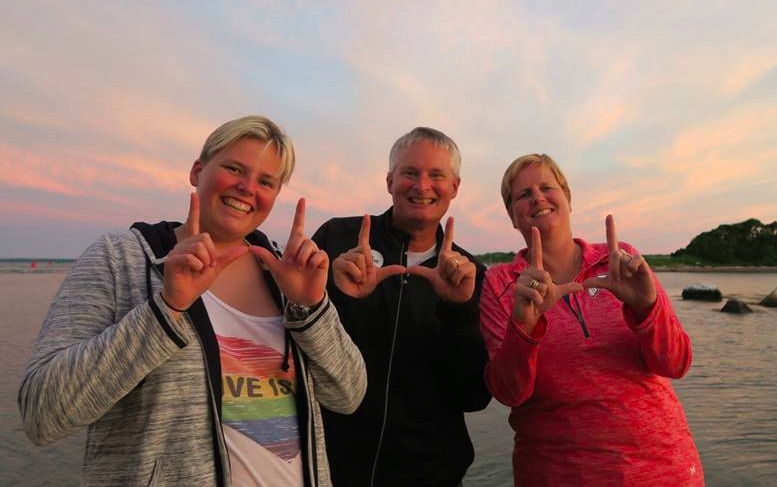Welcome to another installment of Interviews with Real Female Physicians. The goal of this series is to share their story so that you, the reader, may learn and be inspired by their experiences – good and bad. We all come from different backgrounds and have different situations. Some of you are married, some are not, some with kids, some with blended families. Let’s show other women that any of these can work financially!
Tell us about yourself:
My name is Harriet Hopf. I’m an anesthesiologist and professor at the University of Utah in Salt Lake City, UT. I have been married for 31 years to Leo, a self-employed management consultant, author, and educator who focuses on strategy and decision-making. We have one child, E McKinley, who recently graduated from Colby College in Maine with a BA in American Studies, is back home coaching volleyball and applying to graduate school, and has a passion for justice and educating their peers about sexuality and health. We love sports: we have season tickets to the Utah Jazz NBA team and U of U women’s volleyball, basketball, and gymnastics, and men’s football and lacrosse, and I served on the Athletics Advisory Council at the University of Utah for six years. When we aren’t being spectators, we love hiking, biking, and snowshoeing in the spectacular landscapes of Utah; dance; music; and travel.
I grew up in New Hampshire. I met my husband at an intramural volleyball game between the business school and the medical school. I knew he was the guy for me when I smashed the ball in his face and that inspired him to ask me out. I completed anesthesiology training at the University of California, San Francisco, including research fellowship, in 1992, and was on the faculty there for 14 years before moving to the University of Utah in 2006.

I love my specialty, although it took me a while to figure that out. I matched in surgery but realized quickly it wasn’t right for me. After internship, I went to a surgery lab at UCSF to study oxygen and wound healing. I quickly realized that anesthesiologists hold a key to preventing surgical site infections through managing patient physiology, so I made the jump to anesthesiology residency. It was only on the first day I realized the many reasons I had made the right choice: 1) anesthesiologists monitor everything, so there’s immense opportunity to understand what is going on with a patient, as well as to see the immediate impact of interventions; 2) I love invasive procedures and was worried I would lose that in leaving surgery, but anesthesia procedures, including vascular access, peripheral nerve blocks, and neuraxial blocks, often require a much higher level of creativity (finding a vein when none is visible, or finding the epidural space by feel and loss of resistance, for example) and thus I enjoy them more; 3) patient interactions, though brief, are high stakes: I have to gain a patient’s trust when they are frightened and often overwhelmed; 4) when I’m working clinically, it is intense and requires my full focus; when I have a non-clinical day, there is virtually no chance I will get called to the operating room. I love both the intensity of practice and the ability to protect time for other pursuits (research, education, administration). For medical students considering anesthesiology, it’s good to like planning and preparation, and also making quick decisions in a crisis; in fact, much of our training is learning how to make the right decisions in a crisis. You have to be good at managing a team and leading when you are not “in charge.” The better we do our job, the less we are noticed. For some, that is uncomfortable, but I happen to enjoy the challenge.
Did you graduate with student loans?
I grew up in the one state (NH) that has neither a state medical school nor an agreement with another state medical school, so I attended the closest thing to a state school for me: Dartmouth, where tuition and fees were, of course, higher than at a state school. My state loaned me $10,000 for my education, with no interest until I finished training, then at 7% interest. For context, HEAL loans had an interest rate of 19% at the time, so it was a great deal. I received very generous scholarships during medical school, which helped immensely, and which is why I donate to the scholarship fund every year. I was parsimonious and lived on $3000 less than they thought I should (the contribution “expected” from my parents), in an unfinished basement apartment my husband (then boyfriend) and his business school friends called the Hobbit Hole. I graduated with $130,000 in debt (1986 dollars), a combination of GSL loans at 7% (including those from college; no-interest until I finished training and I went to med school immediately after college graduation), Dartmouth’s version of HEAL loans at 12% compounded immediately, and the state loan.
How fast (or not) are you paying them off and how are you paying them off?
We paid off all our loans (my husband’s $30,000 from business school plus mine) 7 years after graduation. As an intern, before we were married, I was paid a princely $20,000. Because this was before work hours rules (100-140 hour weeks at my program), I didn’t have time to spend money and I managed to pay $100 more than the interest each month on my HEAL loans. Leo and I were in different states at the time. When I moved to San Francisco after internship, we moved in together (and married a year later). At that point, we chose to use all of my income (which increased to $35,000 a year) and half of his to pay off loans. Our life-style got better every year, since Leo got a raise each year at his consulting job, which was better paid than residency. Once we had paid off the loans (a year after I completed training; at that point, my faculty salary was $130,000 a year), we continued that model for a year, which enabled us to save $100,000. We used that money to fund a 14 month trip around the world, plus the down-payment on a house when we returned home. I recognize how fortunate I was to 1) go directly to medical school, 2) find a partner who also had a good income, and 3) have the option to delay having a child.
Financial aspects of kids
When did you have them?
We had our child 6 years after I finished training, 10 years after we got married, and 6 months before I submitted my promotion file. We chose to delay having kids, mostly so we could go on our big trip. We thought we would want more than one child, but the family unit just felt right, so we stopped at one.

Are you planning to fund their college expenses?
We were fortunate that Leo’s mother made yearly contributions to a 529 for her grandchildren, starting when they were born. We also contributed. The 529 covered the first 3 years (with child expected to earn enough to cover personal expenses). We are fortunate to have the means to cover the 4th. The kid was offered scholarships at many schools, but chose one that did not offer scholarships- we were fortunate to be in a position to allow that choice. We had a lot of discussion on this topic. My husband went to state school and paid his own way. I went to a private liberal arts college and my parents paid tuition, room, and board for me, except for the GSL loans I took out that covered about 25%; part of the funds came from their benefits as college professors. The reality now is that the ratio between what a college student can earn and what they have to pay for tuition is sadly out of whack and substantially higher than when we went to college. I’m glad our kid was able to focus on school and not finances. And I’m acutely aware of the extent of our privilege to be able to do that.
What were your childcare expenses?
We had a full-time nanny until our kid was in middle school, and then had a part-time nanny, mostly for transportation. We chose that because of my work hours (early and late), the fact that both my husband and I travel a lot, and the fact that sick kids can’t go to most day-cares. It worked well for us. We paid at the high end of going rates (privilege, again), salaried at more hours than they actually worked (which gave both flexibility and loyalty), and provided health insurance and 3 weeks of paid vacation.
Was your child in private or public school?
Our child attended a Montessori school for kindergarten. They attended public school for 1st-3rd grade in CA, where we contributed ~$4000 / year to fund PE, music, and computer education because they were not covered by state funds. When we moved to Utah, they attended a private, independent school which cost ~$15,000 annually.
Financial aspects of marriage
Did you get a pre-nuptial or post-nuptial agreement?
We had a pre-nuptial agreement that stated that neither one of us had any assets and that one of us helping with the other one’s loan repayment did not constitute an agreement to continue to pay if we got divorced. It was drawn up by one of my recreation basketball teammates who was a lawyer and did it for free. We burned the agreement the day we paid off our loans, 5 years into our marriage.

Do you and your partner agree on finances?
Generally, yes. My husband has an MBA, so he has taken the lead on finance. Both of us hate debt, so it was easy to agree to our arrangement to live on half his salary to get the loans paid off. When we moved in together, we had separate bank accounts. We calculated our monthly costs and each contributed monthly (on a sliding scale by income) to a joint account that we used to pay the bills. We continued that until we had been married about 5 years, when we both felt comfortable doing everything as a joint account.
Early on, we agreed on a “spending limit,” the amount either one of us could spend without consulting the other. At the beginning, it was in the range of $50 and has risen over time to $500. When my husband was in a consulting firm, he got annual bonuses. One of the best things we ever did was to contribute 5% of the bonus to an individual account (in the range of $2000 a year) for each of us. This is money we can spend however we want, without input or judgment from the other. This prevented a lot of uncomfortable discussions about expensive camera equipment or paying for travel for family members, for example. Once he went out on his own, it was based on his income for the year.
My husband also made me contribute to 403b/401k starting as an intern, for which I am grateful. I didn’t know what they were and thought I couldn’t afford it, but he pointed out that pre-tax donations cost almost nothing and early contributions to retirement accounts have the most impact on retirement income.
Are you the breadwinner?
We are dual breadwinners, although I have only out-earned my husband once in 31 years. On the other hand, it is my health insurance and steady income that allowed him to go out on his own 16 years ago.
Financial mistakes:
What financial mistakes have you made?
When I was a 4th-year medical student, Leo was appalled to learn that my car insurance deductible was only $100. He made me read “The Only Investment Guide You’ll Ever Need” by Andrew Tobias (which everyone should) and raise it to $1000. The day I did, my mother borrowed my car and was in an accident ($2700 damage, all to the car, none to her or the other driver). The good news? The deductible change didn't go into effect until the next day.
General Finances
Who handles the finances in your relationship? Do you DIY or do you have a financial advisor?
My husband has an MBA, so he generally handles the finances, but we discuss all decisions and all assets are in a joint trust we created before our child was born. We were DIY until our finances became complicated by things like start-up investments and a child. We are mutual fund investors and don’t play the markets. We have paid cash for each of our cars, which we tend to own for a long time, including one of our current cars, which is 21 years old and has 215,000 miles on it. We just paid off our home loan, 12 years after buying the house. These habits, plus living in a cheap apartment and not buying furniture until we were 35, plus buying a house in the Bay Area in 1995 and selling it in 2006 at more than twice what we paid for it, have allowed us to not have to worry much about our finances.
How are you saving for FI/retirement?
I have a 403(b) to which I have always contributed the maximum and a 14.2% defined contribution retirement plan through my work. I rolled my UCSF retirement accounts over into Roth IRAs, where we have put the rest of our retirement savings as well. We invest in index funds with a fairly conservative allocation which we re-evaluate annually but change very little. We have a house with no mortgage. We have enough to retire when we want to.
Do you have insurance?
We both have long term disability insurance, and mine is specific for my specialty. We both have life insurance, a large amount of term that expires a few years after we retire and a modest amount of whole. We also have long-term care insurance. We just reassessed all of our insurance and created a new will after E turned in January.
Have you had to use (long term) disability insurance?
I’m particularly grateful right now for the specialty-specific long-term insurance. I have bilateral basal thumb arthritis that became so bad in July I had to step out of my clinical practice. I had a tendon transfer and MCP release on my left thumb in August and I’m scheduled to have the right thumb surgery in February. Thus, I’m on what is likely to be a year-long hiatus from clinical practice. Although I can continue to work full time as a professor, most of my salary comes from clinical practice. Our finances are such that we’d be okay with only my base salary, but it’s nice to have at least a percentage of my clinical salary as well.
If you are FI or “retired” – what are you doing?
I’d call us FI. We spent very little early on and paid off our school loans quickly. Once they were paid off, and given we had two good incomes, we were able to spend more freely and focus on retirement funding. We just assessed our total assets as we re-did our will, and the retirement funds are much larger than we had realized. I hit 59 ½ years old on Thanksgiving day, so we can now access our retirement accounts if we need to. We continue to work because we both have jobs we love. It’s nice to know we can retire when we want to, though. And it’s fun to consider what the next chapter will look like, even though it is a few years off.

Do you give to charity?
I give to a number of charities annually, as does my husband, and we make some donations jointly. For my undergraduate college, I give to the general fund and to the basketball program, in gratitude for the impact they had on my life. I give to the scholarship fund for my medical school, to pay it forward. I donate to the Executive Leadership in Academic Medicine program at Drexel University to support leadership education for women in the health sciences, in gratitude for the impact the program has had in my life. I donate to the Foundation for Anesthesia Education and Research because of the important contributions they make to developing future clinician-scientists and advancing my field. I donate to several environmental and civil rights groups. We provide support to two local, innovative dance companies, the Utah Symphony, and the University of Utah College of Fine Arts, because of the importance of the arts in society. We donate to the University of Utah general fund, specific initiatives, and in support of women’s athletics generally and the volleyball team specifically.
Any parting words of wisdom?
Choose your life partner (if any) wisely. In particular, make sure they are enthusiastic about your success and are willing to be equal partners. If possible, try to find someone who is not in medicine. Your conversations will be more interesting and they will stretch you to see and experience the world in different ways. My strategy and decision-making guru has been a remarkable peer mentor, even though my personal style of decision-making runs to the intuitive.
Tell readers a fun/random fact about you:
I played 3 sports in college: basketball, softball, and track. I was a walk-on in all three sports (different era!). I was a starter in basketball as a junior/senior, in softball as a senior, and set the high jump record in my first year.
And finally, where can people connect with you?
Twitter: @HarrietHopfMD

Get the bestselling book - Defining Wealth for Women.



